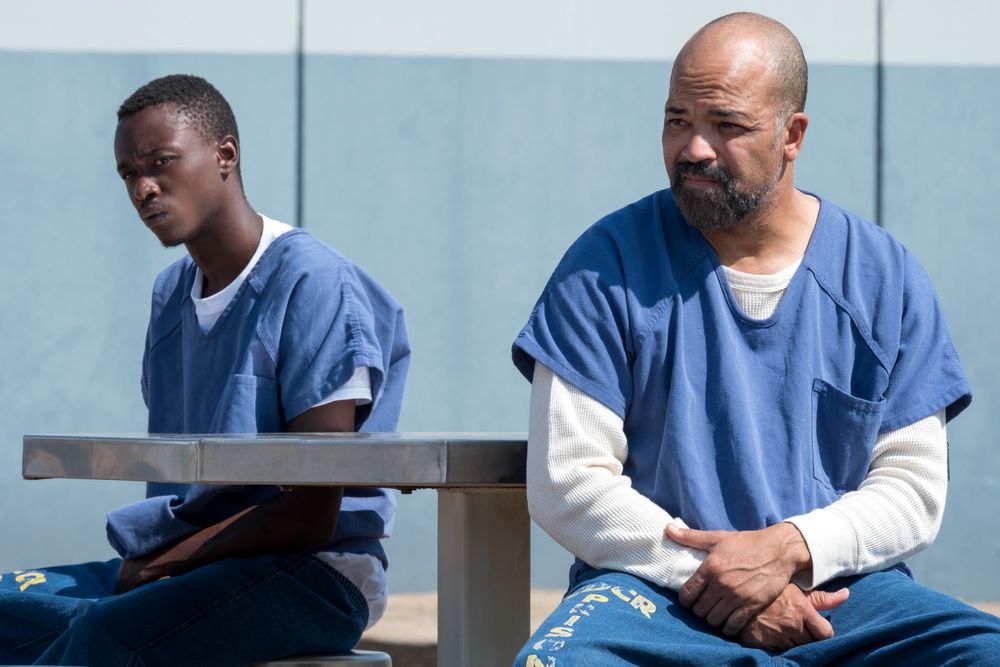Photo: Matt Kennedy/Netflix
Of all Black actors of his generation, Jeffrey Wright is far and away the most likely to receive one of those honorary Oscars for a career of overlooked excellence. Run back his 30 years of television (Boardwalk Empire), Broadway (Angels in America), and Hollywood (Basquiat, Ali) roles and it’s clear that he never phones in a performance.
Earlier this month, the season three finale of HBO’s sci-fi series Westworld — in which Wright plays liberated android Bernard Lowe — overlapped with the release of Netflix’s All Day and a Night, in which he portrays misguided dad to the homicidal, equally misguided Jahkor Lincoln (Moonlight’s Ashton Sanders).
This is a story of a father trapped by limited resources, limited opportunities — he’s frustrated, embittered, angry. Capable of more, but incapable of realizing the more that exists within him.
LEVEL rang the 54-year-old actor for a short convo about some big projects.
LEVEL: What drew you to All Day and a Night?
Jeffrey Wright: [Writer-director] Joe Robert Cole reached out to me about this film, which is a personal one for him. I was immediately curious because of the experience I had working on O.G., which we filmed in a maximum-security prison in Indiana. I played a guy who’d been incarcerated. In the process of working on that film, I had an opportunity to speak with my co-stars, most of whom were men who were serving long sentences in Pendleton Correctional Facility; they described personal histories that involved parental neglect, parental drug abuse, parental abuse. It was startling to me how consistent the absence of parental influence had influenced the choices and missteps that they made that led them to a life of incarceration.
I kind of viewed this film as a companion piece to that. There’s another film that I did called Monster, in which I play the middle-class father of a young man who finds himself on the wrong side of the law. The three of those performances for me are kind of a personal trilogy looking at incarceration, criminality, and criminal justice from a triangulated perspective.
In this case, this is a story of a father trapped by limited resources, limited opportunities — he’s frustrated, embittered, angry. Capable of more, but incapable of realizing the more that exists within him and expressing that. And imprinting that onto his son.
You and your co-star Ashton Sanders have some interesting overlap. You won a Tony acting in playwright Suzan-Lori Parks Topdog/Underdog, and he played Bigger Thomas in her adaptation of Richard Wright’s Native Son on HBO last year. What sort of synergy did you find working together?
Most of our interaction happens from afar, but obviously we come together when both characters find themselves behind the prison wall. Ashton is a very full actor. He brings so much emotionally and intellectually to every moment that he’s working. It’s a real pleasure to work with someone like that, because you’re getting so much information to play off of. He’s one of a crew of really interesting, talented, exciting young performers out there now. When I saw Moonlight, I was just struck by what he did in the middle of that film. I was surprised he wasn’t recognized more widely with the flowers and the laurels and all that stuff, but that’s how these things go. He’s a wonderful actor.
How would you compare your character Bernard Lowe’s latest season on Westworld to the previous two?
He’s still very much on a journey of discovery, which kind of characterizes Bernard. He’s in some ways always sleuthing — he provides eyes for the audience on discoveries that we make as the show carries on. In the first season, he’s on a journey to determine anomalies that are happening with the hosts inside the park, and that journey leads him to self-discovery about his own reality. In season two, he’s trying to redefine himself, recreate himself, and search for these truths that help him rebuild himself and build a new type of freedom. And now, he continues along this search for answers to Dolores’ agenda, and to how he may or may not be manipulated by external forces. So he continues on, just on a very different level of exploration and detective work that began really at the first season.
In All Day and a Night, the grandmother says: “Everybody has one moment where they know they’ll live a great life. Find the thing you love and pour your heart into it.” What was that moment for you?
In hindsight, it would revolve around moments in my youth that brought me great joy, peace, a sense of belonging, and a sense of love for life. Something I experienced on multiple occasions as a kid, the thing that woke me up at 4:30, 5 in the morning: going out fishing on my grandfather’s oyster boat with all of our family and friends. That was on the lower Chesapeake Bay, off of Tidewater, Virginia. On Saturday mornings occasionally during the summer, he’d take us all out on the boat, and we’d be out there from early in the morning until the fish ran out. Those were such experiences of perfect contentedness and joy that they gave me a window onto what was possible in this life.
